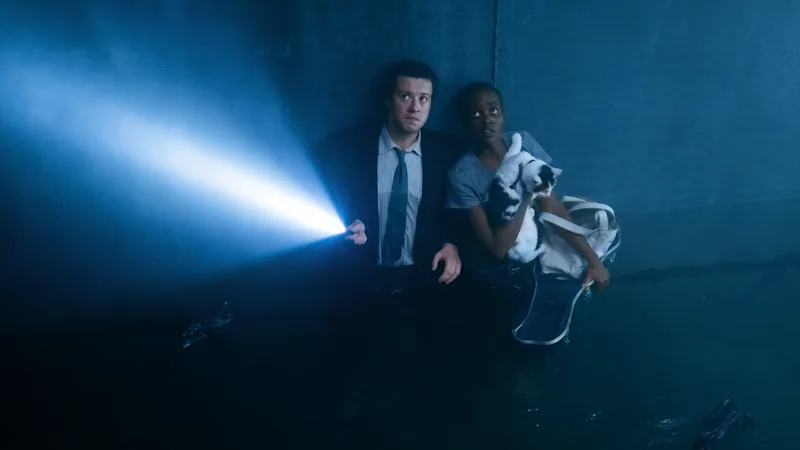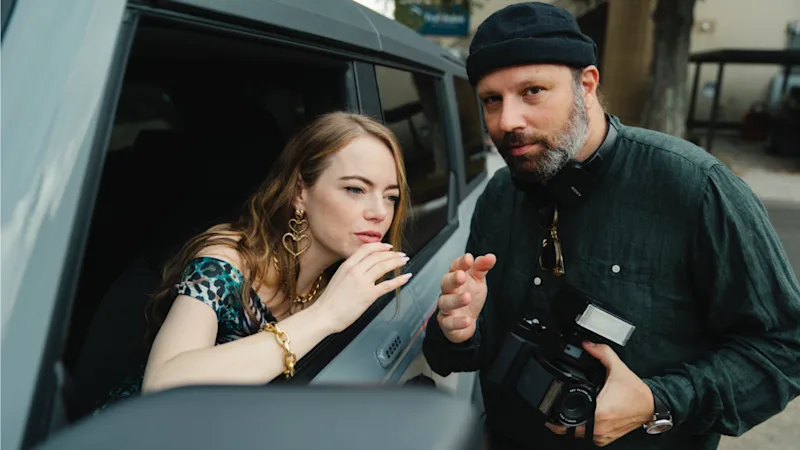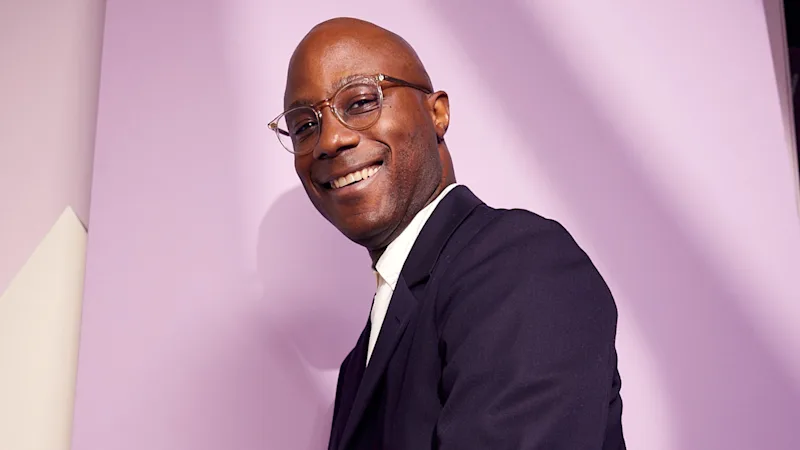Garth Davis has never made a movie like Foe. The sci-fi drama centers on a married couple living in a near-future American Midwest, whose quite life is disrupted by the arrival of a mysterious stranger. In more ways than one, it marks a major departure from Davis' previous feature efforts, 2019's Mary Magdalene and 2016's Oscar-nominated Lion. Foe is his first step into the world of high-concept genre storytelling, yet Davis says he wasn't drawn to the film because of its sci-fi elements.
Instead, the Australian filmmaker was impressed by how its source material, a 2018 novel by Iain Reid, used its dystopian setting to explore a timeless story. "What I loved about Iain's novel was that it was such an unusual way to explore a relationship. That's what really excited me about it, because at the heart of the film, it's a relationship story," says Davis, who co-wrote the adaptation with Reid. "It's really a portrait of a woman trying to save her marriage and also find agency in her own life. The novel offered a way to approach those topics in a manner that felt unique and exciting."
At the center of the film are Henrietta and Junior (Oscar nominees Saoirse Ronan and Paul Mescal). One night, a man, Terrance (Aaron Pierre), unexpectedly shows up at their home with life-altering news: Junior has been conscripted to be one of the first members aboard a revolutionary space station. In his absence, Henrietta will stay on Earth with an A.I. version of her husband. The proposition, as well as Junior's impending departure, force him and Henrietta to reevaluate their already fragile relationship.
As important as the world building may be to Foe's story, Davis chose not to rely on futuristic technology or space-set sequences. "I'm old now, so all I really want to work with is stuff that's real," the 49-year-old director says. "But you've got to have discipline. When I was younger, I probably would have been desperate to put more space scenes in the film, but there's enough in there now."
Ultimately, Davis chose to bet on his belief that merely alluding to the presence of Foe's futuristic cars, factories, sky colonies, and spaceships would be more effective. "There was something I found exciting about that approach, because it allows you to feel like those elements are always present even when you don't quite see them. I love that feeling. I love igniting viewers' imaginations, so they color certain things in themselves and apply their own feelings and ideas to what they’re seeing on-screen."
A.frame: What were some of your early visual ideas for the film?
Very, very early on, I had this idea that Junior would be holding onto ghosts. He's holding onto his family's legacy, which is this once very beautiful farm that has obviously perished over time. I really felt that the farm should be a very nostalgic environment, almost like a haunted house that is, in many ways, full of memories. The farm is also our view into the natural world. Junior has kept it and protected it, and when we leave that environment, I was thinking a lot about corporate takeover-esque mega farming. I wanted everything else to feel almost like a monoculture.
I loved the idea of playing with the audience by showing some of the environments around Junior's farm and making them realize that the natural landscapes themselves are beautiful, but they're also terrifying. I feel like that's reflective of life these days. We're always like, 'Isn't life amazing?' while we're all gradually sliding to our death. It's beautiful but tragic, and Henrietta even says at one point in the movie, 'It's funny how dying can be beautiful.' There's something amazing and poetic and tragic about the fact that there's all this color in even a dying world, and I wanted to showcase that.
There were also the sci-fi elements, and I thought it was important that the film felt imminent. A lot of sci-fi movies are so out there that they become their own beautiful, existential experiences, but I wanted Foe to make audiences feel a sense of urgency in their own lives. I want people to watch the movie and think, 'What am I doing? Am I honoring what I am? Am I doing enough in my relationship or for nature?' I thought making sure the sci-fi components felt closer to where we are right now would make the film feel more believable and easier for the audience to believe in the stakes of it.
Can you talk about your decision to use the Australian wilderness as a stand-in for a post-apocalyptic American Midwest?
When I was exploring the Midwest and looking for places to shoot, nothing really fit my vision. In Australia, climate change is accelerating at such a fast rate. Nearly two-thirds of my state burnt down a few years ago. It all can happen very fast, and I wanted to present an environment that felt like it had been decimated very quickly, and Australia has that landscape. The spirit of the land here is very ancient. There's a feeling that a lot of it's been used up and kind of lost. Juxtaposing those prehistoric and powerful qualities of the Australian wilderness, as well as its harshness, against a seemingly simple Midwestern farm felt really great, and I wanted to do it all in camera too. I didn't want the whole thing to be visual effects. I wanted to create a world that you could feel and experience and think, 'Wow. This is real.'
The film is essentially just three people talking to each other in one location for two hours. What was the trickiest part of writing the script?
You've got to make sure the audience is engaged. You've got to give them something to hunt for. They've got to be actively participating. They can't just sit back and watch people talk in a room, because they'll just get up and leave. For Iain and I, we had to make sure there was enough inherent mystery in the story, performances and filmmaking to suggest things that contradict the story you think is happening. We never took the audience's attention for granted, and we realized that we really had to bring them into an intimate story that was also a highly charged mystery. Part of that involved taking the viewer in one direction and then occasionally making a sharp right turn out of nowhere.
What I found exciting about that is that we're all so conditioned to how stories are told these days that we've almost got an inbuilt compass. We were trying to send that compass in a million different directions, because the movie is about waking you up. We had to ask the audience to engage and participate and then, hopefully, when everything is revealed, they experience a sense of emotional satisfaction in discovering everything and understanding the true meaning of what we're trying to get across.

What was it like working with Paul, Saoirse and Aaron?
This film really lives and dies on its performances. Everything always does, but that was particularly true for this film, because there's nowhere to hide. There's no action. It's literally just about these characters' stories and their psychologies. So, casting was the most critical aspect of making the film and making sure the alchemy was right between the three characters. Henrietta, in particular, I felt was the most important character to get right, because she's the spiritual heart of the movie, and Saoirse is such an incredible actress. Her spirit shines through in everything she does. Once we cast her in the project, finding the person to play her husband was a great challenge, because it's hard to find someone who can match her. Then I met Paul, and there was that shared Irish heritage between them and he has all of these beautiful qualities. They just really felt right together.
And Aaron Pierre came out of nowhere. There's such a great contrast between his performance and Paul and Saoirse's. He has this incredible presence, this beautiful physicality, and this wonderful instinct for truth. What he's doing in the film is very difficult; all of his provocations, moments of charm, and slightly sinister observations are very nuanced and difficult to find the truth in. But I think all of the actors are really flying all the time in this movie.
Did they bring anything to the material that surprised you or wasn't there originally?
They always do. In every film. That's my experience, at least. What's beautiful about having actors who really want to make something with you is that they're very passionate about it. They do a lot of work for it, and they bring their own connections to their characters. In that process, new things do come up. Saoirse, for instance, was really keen on inserting some dialogue for her character that was specifically about what we've all been taking from the planet and how we've been stealing from the planet. That's something she feels very strongly about in her own life, and so there were some adjustments made there. But otherwise, it was a really normal process in that the collaborations with all three only enriched what we already had and took us in all of these amazing directions.
Foe feels indebted to a number of classic films — watching it, I thought of Who's Afraid of Virginia Woolf? but also Her and Eternal Sunshine. When you were making it, were there any specific movies that you had in your mind as touchstones or references?
In terms of just brave and raw performances, I'm a huge John Cassavetes fan. I also love Who's Afraid of Virginia Woolf? I really love those kinds of noisy performances. There's something very brave about an actor doing that, because there's no turning back, and that was a film I mentioned early on in the process. I told the actors, 'I really hope we can bring back that certain kind of old-school cinema and those types of performances,' so that film was definitely a touchstone. Other times, it was just paintings that we'd go to for reference. Andrew Wyeth was someone whose work we looked to at one point, and the same goes for Andreas Gursky and those huge factory images he made. Ultimately, I guess I draw from a lot of places, and showing those references to the actors can give them a good sense of where your instincts lie.


You only have three characters in Foe, but the film's sound design does make Junior and Henrietta's house feel like its own character, too. What did it take to get that aspect of the film right?
A lot of detail went into the sound design, because the film is so intimate. There's the musical score, but the movie's sound design plays a huge part in affecting the psychology of the audience. The insects that are shown throughout the movie, for example, are almost like an element of the score in their own way. Generally speaking, I love a wide and open sound design in my films. Even if we're shooting in a corner of a room, I love to use sound in a way that suggests a huge space beyond the boundaries of the frame. It's really beautiful when you're shooting an actor's face but you can still make the audience feel the world around them. That's how I really love to use sound design, and that's particularly present in this film.
Without spoiling anything, Foe takes a number of creative risks. When you're writing it and you're putting it together with those risks in mind, how much more daunting does that make the creative process?
At the end of the day, you just have to have conviction and confidence in your vision. You have to make sure that everything is truthful and never go off on an ego trip. Every moment has to feel like it's urgent and truthful and, ideally, brave. Otherwise, how will cinema continue to progress? I think everyone who worked on this movie wanted to work on it because there is something very brave about it, and I don't know about you, but I'm not into homogenous filmmaking. I want to be challenged. When I go to an art gallery, I want to see a multitude of different voices. I don't want to see just one voice.
I feel like we're in an era of cinema where it has all become a huge business, and it does feel a bit like the mega factories shown in our movie. I feel like we're a Trojan horse rolling inside with our own quiet little revolution, spreading love and kindness through the middle of it all — hopefully, at least. There are going to be people who find this film and the choices made in it difficult, but I'm really proud of the boldness of it and the story we've told.
By Alex Welch
RELATED CONTENT:
Paul Mescal Wants to Challenge Everything You Think You Know About Him (Exclusive)







